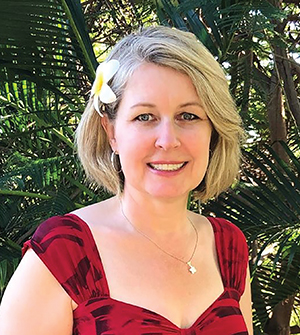Anal Cancer Survivor
Emotional Healing Comes from Helping Others
 In the spring of 2017, social worker and author Angela Gentile was diagnosed with Stage III anal cancer at 51. She relied on her faith, family and friends — and an extraordinary project — to overcome the physical and emotional challenges associated with this rare disease.
In the spring of 2017, social worker and author Angela Gentile was diagnosed with Stage III anal cancer at 51. She relied on her faith, family and friends — and an extraordinary project — to overcome the physical and emotional challenges associated with this rare disease.
Who knew you could get cancer up the bum? I didn’t until a quick Google search about what I thought were stubborn hemorrhoid symptoms pointed to anal cancer. I saw my doctor the next day. I don’t remember her exact words, but I’ll never forget the look on her face after she performed a rectal exam. She’d felt a lump and found blood. She scheduled an urgent colonoscopy, along with a referral to a specialist. It was confirmed I had anal cancer. Because lymph nodes were involved, my diagnosis was Stage III.
The lump was a tumor that appeared to be growing quickly, so I was put on the fast track for treatment. The plan included two 96-hour treatments of infused chemotherapy through a pump and 30 rounds of pelvic radiation. Before I could start, however, a very painful perianal abscess appeared in my anal canal, and I had emergency surgery to clean it out.
Treatment affects everyone differently. I developed febrile neutropenia (high fever and low white blood cell count) and was hospitalized for a week. I’m fair-skinned, and I had a pretty severe reaction to the radiation. My radiation oncologist and her nurse gave me several suggestions for things to try and things to avoid. Sitting in my bathtub filled with baking soda four times daily was soothing. A topical antibacterial cream used to prevent infection in burns was most helpful.
I went into survivor mode. I have a close-knit support system at home in my husband, son and daughter. My daughter created a giant chart to make sure I stayed on schedule with meds, baths, etc. I can’t leave out my dog, Rocky, who was at my bedside constantly. And as I was recovering, we welcomed a new puppy, Berkeley, into our lives. Getting up to let her out and care for her also helped me by ensuring I got up and kept moving.
Cancer is a big revealer. I learned loud and clear whom I mattered to. The messages, flowers and little gifts I received from family, friends and colleagues were incredible. I turned toward my faith and was given advice that was exactly what I needed to hear at the time: let God carry you through.
I also found support through Facebook groups. One was just for women, and we discussed the way anal cancer can impact a woman’s health. I have what’s referred to as collateral damage from the radiation therapy. Radiation beams aimed at the cancer can affect neighboring organs, such as the bladder, bowel and private parts, which has changed the way I’m able to do certain things. What helps me most with these ongoing challenges is being upfront and honest with my general practitioner. When I have an issue, she refers me to the right person, whether it’s a gynecologist or GI doctor. It’s up to me to tell her if I’m having a problem. I have to be my own advocate. I’m not the same person because of that damage, but I’m working around it and am grateful for every day. Getting back on my bike for the first time was a huge turning point for me!
My treatment ended in August, and in November 2017, scans revealed I was NED (no evidence of disease). I will have follow-up visits every six months for five years.
Once treatment ended, life didn’t just go back to normal like you might expect. For two months during active treatment I’d been surrounded by a team of people constantly making sure I was okay. Suddenly, they were gone. I still wasn’t able to go back to work or resume my volunteer activities due to the lengthy recovery from treatment. I felt like an empty shell and became clinically depressed.
I began taking medication. I also thought that, as a writer, a good solution would be to tell my story. I quickly realized that my story wasn’t enough. I reached out on social media to ask if anyone whose life had been affected by anal cancer had a story to tell. The response was overwhelming. Patients, caregivers, loved ones – so many people had stories to tell, and I had a new purpose. I decided to write an anthology, a book composed of all their stories. I’d never written one, so I researched and learned how. I interviewed wonderful people and wrote stories filled with practical information. Some of the stories are hopeful; others are educational. The project was healing. It gave me a purpose not just as a survivor but as a human being. Even better, I could do all of it while I was lying on the couch recovering.
It took about nine months to finish and self-publish Cancer Up the Wazoo: Stories, information and hope for those affected by anal cancer. It’s available on Amazon.com with a portion of every sale going to the Anal Cancer Foundation. I hope that hearing from the 25 people involved in the book empowers and inspires other people affected by anal cancer. Helping others tell their stories was a way to help me cope and heal. Now I’m able to close the book on that chapter of my life and move on with my “new normal.”


